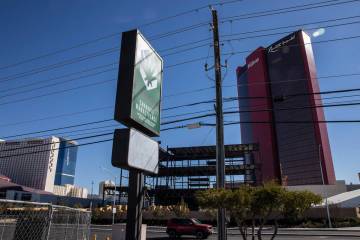Using medical pot firing offense in Nevada
Smoke that medical pot like it’s your job, Nevadans.
But if you’re not careful, your real job might go up in smoke.
Despite the recent arms race to approve medical marijuana dispensaries in the state, the law is still clear: If you test positive for marijuana — medical marijuana card be damned — your employer can fire you, local labor lawyer Tony Golden said Wednesday.
He spoke to about 20 Las Vegas human resources managers at Cashman Center about medical marijuana in the workplace, fielding questions from a variety of employers ranging from Clark County government to the Hakkasan nightclub.
Golden explained that, although Nevada law instructs employers to make “reasonable accommodations for the medical needs of an employee who engages in the medical use of marijuana,” the stipulation doesn’t really matter. The federal government still considers marijuana an illegal narcotic, and that is enough justification for a boss to fire an employee.
Probably.
“There’s confusion in the workplace, and not just from people smoking pot,” he joked.
The confusion exists partly because no medical marijuana user has sued an employer after being fired for testing positive for marijuana, Golden said. So there’s no case law in Nevada for lawyers or employers to analyze.
So until the federal government relaxes its standards on marijuana — or until a Nevadan challenges his firing in court — the federal ban on pot trumps the state law, he said.
That means a person with a medical marijuana card is putting his job at risk when using the drug, he said.
Marijuana is different than prescription painkillers, such as the opiate hydrocodone, or alcohol. It’s easier for an employer to determine whether an employee is abusing painkillers or alcohol through tests.
But it’s difficult to accurately determine if a person is high at work, he said.
Regular pot users could have marijuana metabolite in their blood for weeks after smoking, Golden said. If an employer suspects an employee is high and orders a drug test, it doesn’t matter if that person hadn’t smoked in week or a month — the test might be positive.
“There’s just no good way to assess marijuana impairment,” he said.
And whereas doctors will prescribe a certain dosage of painkillers, a medical marijuana card allows users to determine their own dosage. A man might prescribe himself “two joints a day,” but his employer doesn’t have a baseline to determine if he’s abusing the treatment.
The no-tolerance policy applies if someone smokes legal, recreational marijuana in another state, too. A Nevada employee who smokes pot on a ski trip in Colorado and later tests positive for marijuana can still be fired, even though the person never broke the law.
“It’s not criminal, but it doesn’t mean you won’t lose your job,” Golden said.
Aside from hiring a lawyer, there’s not much workers can do to appeal their firing.
Federal and Nevada equal rights agencies won’t touch marijuana claims, he said, leaving the matter to the courts.
But Golden also stressed that the laws could change. If the federal government relaxes its ban on marijuana, local employers will be forced to reassess the state laws on pot.
There are also six bill draft requests about medical marijuana pending for the next session of the Nevada Legislature, he said, so there’s a chance state lawmakers will provide more clarity for this cloudy issue.
Employers can also provide clarity by communicating clearly to employees, Golden said. If an employer doesn’t want employees using marijuana, they should specify in their handbook that the company prohibits all drugs banned by the federal government.
“The policy should be consistent,” he said.
As for Nevadans with medical marijuana cards? Don’t be too bold. If you come to work with red eyes and smell like skunk, you’ll soon have more time than you wanted to smoke your medicine.
At home.






















